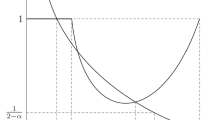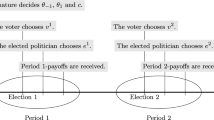Abstract
This paper studies a principal-agent model of the relationship between office-holder and an electorate, where everyone is initially uninformed about the office-holder’s ability. If office-holder effort and ability interact in the determination of performance in office, then an office-holder has an incentive to learn, i.e., raise effort so that performance becomes a more accurate signal of her ability. Elections reduce the learning effect, and the reduction in this effect may more than offset the positive “re-election concerns” effect of elections on effort, implying higher effort with appointment. When this occurs, appointment of officials may welfare-dominate elections.
Similar content being viewed by others
References
Aidt, T., & Margis, F. (2003). Capital Taxation and Electoral Accountability. Working Paper 0318, Department of Economics, University of Cambridge.
Banks, J.S., & Sundaram, R.K. (1998). Optimal Retention in Agency Problems. Journal of Economic Theory, 82, 293–323.
Baron, D., & Ferejohn, J. (1989). Bargaining in Legislatures. American Political Science Review, 87, 34–47.
Besley, T., & Burgess, R. (2002). The Political Economy of Government Responsiveness: Theory and Evidence from India. Quarterly Journal of Economics, 117, 1415–1451.
Besley, T., & Coate, S. (1998). Sources of Inefficiency in a Representative Democracy: A Dynamic Analysis. % American Economic Review, 88, 139–156.
Besley, T., & Coate, S. (1997). An Economic Model of Representative Democracy. Quarterly Journal of Economics, 112, 85–114.
Besley, T., & Smart, M. (2003). Does Tax Competition Raise Voter Welfare? Mimeo, London School of Economics.
Biglaiser, G. & Mezzetti, C. (1997). Politicians’ Decision-making with Re-Election Concerns. Journal of Public Economics, 66, 425–447.
Coate, S. & Morris, S. (1995). On the Form of Transfers to Special Interests. Journal of Political Economy, 103, 1210-1235.
Dewatripont, M., Jewitt, I., & Tirole, J. (1999). The Economics of Career Concerns, Part II: Application to Missions and Accountability of Government Agencies. Review of Economic Studies, 66, 199–217.
Ferejohn, J. (1986). Incumbent Performance and Electoral Control. Public Choice, 50, 5–26.
Holmström, B. (1999). Managerial Incentive Problems: A Dynamic Perspective. Review of Economic Studies, 66, 169–182. Originally (1982) in Essays in Economics and Management in Honor of Lars Wahlbeck (Helsinki: Swedish School of Economics).
Le Borgne, E., & Lockwood, B. (2000). Do Elections Always Motivate Incumbents? Working Paper 580, Department of Economics, University of Warwick.
Mirman, L.J., Samuelson, L., & Urbano, A. (1993). Monopoly Experimentation. International Economic Review, 34, 549–563.
Persson, T., Roland, G., & Tabellini, G. (1997). Separation of Powers and Political Accountability. Quarterly Journal of Economics, 112, 1163–1202.
Persson, T., & Tabellini, G. (2000), Political Economics: Explaining Economic Policy. MIT Press, Cambridge, MA.
Rogoff, K. (1990). Equilibrium Political Budget Cycles. American Economic Review, 80, 21–36.
Swank, O., & Visser, B. (2003). Do Elections lead to Informed Public Decisions? Unpublished Paper, Erasmus University.
Author information
Authors and Affiliations
Corresponding author
Rights and permissions
About this article
Cite this article
Borgne, E.L., Lockwood, B. Do Elections Always Motivate Incumbents? Learning vs. Re-Election Concerns. Public Choice 129, 41–60 (2006). https://doi.org/10.1007/s11127-006-0863-6
Accepted:
Published:
Issue Date:
DOI: https://doi.org/10.1007/s11127-006-0863-6




